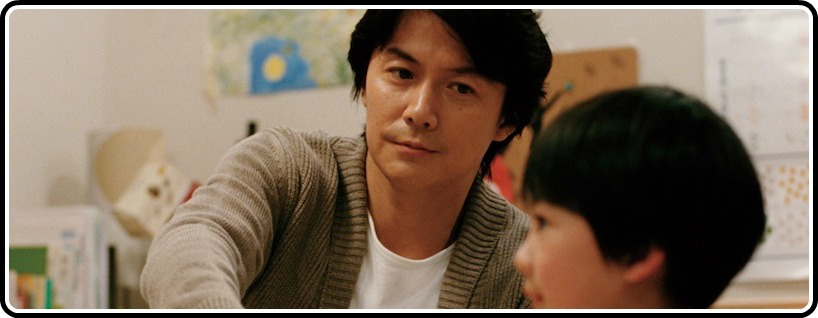
The Nonomiyas are a stably bourgeois Japanese family led by their workaholic architect father named Ryota (Masaharu Fukuyama). They live in a swanky high-rise, drive a nice car, and are the picturesque ideal of modern Japan. We first meet Ryota and his stay-at-home-wife Midorino (Machiko Ono) sitting on either side of their son Keita as the child robotically answers frivolous entrance exam questions—including which family member he takes after most, his talent playing piano, and a made up story involving his father taking him fishing—for a top school in the area. Keita is being nurtured for the best things in life in accordance with their upper class lifestyle, that is until they get a call one day from the rural hospital where Midorino gave birth.
It seems that somehow the hospital switched their biological son with another baby boy born on the same day. Their actual son, named Ryusei, has been living the first six years of his life with Yudai (Lily Franky) and Yukari (Yoko Maki) Saiki, a happy-go-lucky working class family who along with their other two children are crammed into the living space beside the electronic goods store run by the bumbling Yudai. Forgetful, childlike, and lackadaisical yet full of wonder, the Saikis are in stark contrast to the Nonomiyas in mostly every way including the fact that they unconditionally love who they think is their eldest son. The two families meet and they come to the slow realization that they will have to give each child up to the rightful parent, though to help with the switch they agree to meet up multiple times during the week and eventually have each child spend the night in their new true home.
On the surface Hirokazu Kore-eda’s Like Father, Like Son sounds like a patently melodramatic soap opera potentially rife with over the top scenes of custody crises, yet like most of Kore-eda’s deceptively simple stories this one is subtly brimming with rich underlying character details that adhere to the profound humanism at the heart of his feature films. Though it presents an astonishingly even portrait of the situation, the film is anchored to Masaharu Fukuyama’s Ryota, a steely presence who is forced to confront his own notions of parenthood and connection to his son despite having a tenuous grasp on what the concepts truly mean. While he clings to the superiority of bloodlines, the females mostly agree that it’s not about who birthed the child but who raises them.
When Ryota first hears about the mistake he coldly utters, “Now it all makes sense,” yet later he arrogantly spews out an ill-conceived suggestion that the Saikis should just let both Keita and Ryusei stay with he and his wife because he foolishly thinks that having money and means will let them lead a better life. As we learn when he visits his own ailing father, Ryota came from a broken home with a patriarch just as hard-hearted as he is, and by confronting not just the cultural notions of lineage, but most importantly his personal convictions, he’s able to attempt to comprehend what those labels truly mean. Through Ryota’s reluctance, Kore-eda allows the audience to patiently peel back each nuanced layer of the families’ predicament, giving an understated yet profound—but never sensationalized—window through which to deconstruct genuine familial relationships.
But it isn’t all dour seriousness, as the proceedings feature sincerely human moments of comedy as well. Franky’s portrayal of Yudai, with his scenes bounding around a jumping castle or blurting out absent-minded comments, bring some crucial levity to the story while also managing to round out his own character. Also worth mentioning is young Keita Ninomiya whose performance as Keita—especially the expertly heartbreaking last scene with his father—ranks among the most heartbreakingly honest child performances I’ve ever seen.
Though I love Kore-eda’s film I suspect Like Father, Like Son will reveal deeper connotations to me should I become a father one day. Just as the characters’ concepts of parenthood are forced to change, understanding the true genius of the slyly sophisticated concept within us is a relative endeavor that will undoubtedly deepen the impact of this beautiful and profoundly moving film later in life. Despite the ironic tragedy pertaining to the film’s title, Like Father, Like Son left me with a more complex grasp of the phrase, and the film itself left me thinking about the complicated but ultimately human meaning of passing on one’s legacy to your children.



![Bergman Island (The Criterion Collection) [Blu-ray]](https://criterioncast.com/wp-content/uploads/2022/11/bergman-island-the-criterion-collection-blu-ray-400x496.jpg)
![This Is Not a Burial, It’s a Resurrection (The Criterion Collection) [Blu-ray]](https://criterioncast.com/wp-content/uploads/2022/11/this-is-not-a-burial-its-a-resurrection-the-criterion-collection-blu-ray-400x496.jpg)
![Lars von Trier's Europe Trilogy (The Criterion Collection) [The Element of Crime/Epidemic/Europa] [Blu-ray]](https://criterioncast.com/wp-content/uploads/2022/11/lars-von-triers-europe-trilogy-the-criterion-collection-the-element-of-400x496.jpg)
![Imitation of Life (The Criterion Collection) [Blu-ray]](https://criterioncast.com/wp-content/uploads/2022/11/imitation-of-life-the-criterion-collection-blu-ray-400x496.jpg)
![The Adventures of Baron Munchausen (The Criterion Collection) [4K UHD]](https://criterioncast.com/wp-content/uploads/2022/11/the-adventures-of-baron-munchausen-the-criterion-collection-4k-uhd-400x496.jpg)
![Cooley High [Criterion Collection] [Blu-ray] [1975]](https://criterioncast.com/wp-content/uploads/2022/11/cooley-high-criterion-collection-blu-ray-1975-400x496.jpg)